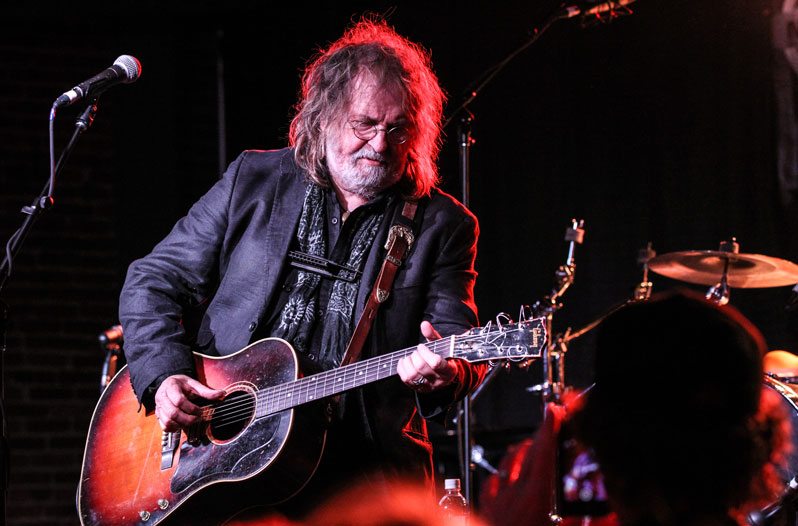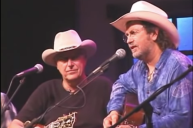[dropcap]G[/dropcap][dropcap][/dropcap]rit n' groove. Tone n' taste. When it comes to Ray Wylie Hubbard's storied catalog, it all goes back to those four elements. It's his secret to the vast majority of his signature sound and style. In many respects, Hubbard is a modern day bluesman. Had he been born at the turn of the century, he'd have been running around with the legendary Mississippi Delta blues players.
Videos by Wide Open Country
With that as his sturdy foundation, he's found a way to both expand and grow while maintaining a sense of respect and loyalty to the rich American roots music of the last century. If anything, Hubbard's been a student just as much a devout fan. So many of Hubbard's best works, Delirium Tremolos, Eternal & Lowdown, and The Grifter's Hymnal, find Hubbard delivering albums that are uniquely him, but dosed with the best features of his favorite artists.
One of Hubbard's most underrated qualities has been his ear for talented collaborators. For most of his career, Hubbard's work with drummer Rick Richards, bassist George Reiff, guitarist and producer Gurf Morlix and in recent years, Hubbard's son Lucas Hubbard, has produced some of the best sounding albums. There's a sonic landscape that Hubbard and company work within that never falls flat, sounds boring or dated. Even Hubbard's albums of the late '90s and early '00s sound as if they were recorded today. They're timeless in a way.
Though his discography is as rich and lengthy as anyone's, here are Ray Wylie Hubbard's 25 greatest songs.
25. "Up Against The Wall Redneck Mother"
While Hubbard is still slightly embarrassed about writing "Up Against The Wall Redneck Mother," he really created the modern "laundry list storyteller" song when he wrote it. Throughout his career, he'd recreate the magic of "Redneck Mother" in various forms --"Screw You, We're From Texas," "Cooler-N-Hell," "Chick Singer, Badass Rockin'"-- while Hubbard disciples like Hayes Carll would attempt their own ("Down the Road Tonight," "Sake of the Song."). At this point, it's played a major role in what Texas Music and Red Dirt have become. And as Hubbard would say, don't write a song unless you can play it forever.
24. "Lucifer and the Fallen Angels"
One of Hubbard's greatest gifts as a songwriter is his ability to take a well-known fable and twist it until it becomes fresh and new. "Lucifer and the Fallen Angels" is like a cousin to Robert Johnson's "Crossroads" tale or The Rolling Stones' "Sympathy For the Devil." He's not exactly selling his soul to the devil for some talent, but rather, giving him a ride for some gas money. Still, there are consequences as old Lou (short for Lucifer), shares his side of the story about being cast out of Heaven.
23. "Night Time"
"There's two kinds of people in the world. the day people and the night people. And it's the night people's job to get the day people's money," sings Hubbard on "Night Time." He'd reuse the line again in "Rabbit," but in essence, the differences between the day people and the night people is what all of Hubbard's material is about. That stark contrast, it's driven Hubbard for some time now. He's not wordy on "Night Time." Rather, he and the band are letting the slow moving blues do the talking.
22. "Count My Blessings"
Hubbard's long lived by the adage "never second guess inspiration." He's gotten more than his fair share of songs that way. Hubbard says he was on Purgatory Road between New Braunfels and Wimberly when he saw a crow on a fence post. From there, he weaves three drastically different stories -- learning to play Three Card Monte, a Lightnin' Hopkins infatuated crow and Sam Cooke's murder. They all tie back into Hubbard's jangling chorus "I believe I'm gonna count my blessings." In each though, there's a slight turn on the phrase.
21. "Screw You, We're From Texas"
Often pretexted with "The problem irony is the problem with irony is that not everybody gets it," "Screw You, We're From Texas" sometimes still goes over people's heads. While it's undoubtedly tongue-in-cheek and brash, Hubbard still delivers a well-crafted anthem. The guitars are greasy and howl as Hubbard goes through all of Texas' best attributes (and a few of its' blemishes).
20. "Cooler-N-Hell"
Other songwriters may like cool stuff just as much as Hubbard, but none write about them quite as effortlessly and cool as Hubbard. It may seem off-hand, but each and every Hubbard name drop means something. Add them all up, Lightnin' Hopkins, a '55 Telecaster, a '68 candy apple red Camaro and a honky-tonkin' woman, you'll swear Hubbard just saw Hopkins' driving by before cutting "Cooler-N-Hell."
19. "Name Droppin'"
While Hubbard often dives into subjects that demand reflection, he isn't above writing songs that focus on simplicity. "Name Droppin'" works off this idea. It's all about the groove and rhythm. The slide guitar and fiddle are just as vital to "Name Droppin'" as Hubbard's actual name dropping and character sketches.
18. "Chick Singer, Badass Rockin'"
I don't want to harp on it too much, but no one lists off cool things in a song quite as effortlessly or as charmingly cool as Ray Wylie Hubbard. "Chick Singer, Badass Rockin'" has Hubbard rocking a little harder than usual. There's a Black Angels psychedelic tinge to it (which he referenced in "South of the River" a record before). He's refined his skills since "Redneck Mother" so the storytelling pops up like vivid Polaroids with every short thought or line despite there not being a linear storyline. He even delivers one of his most vicious lines to date with "believes rock & roll is old leather pants. Says Nashville country is piss ants."
17. "Mother Hubbard's Blues"
If you're a songwriter or musician, you may as well be jotting down notes while listening to Hubbard. His songs are chalk full of free musical advice. He may be singing about his wife, Judy, on "Mother Hubbard's Blues," but lines about good tone, vapor rub and paying your dues are as good as gold. Still, the best -- "The mother asks some tough questions. Like when Jesus went to Heaven, did he leave a vapor trail?" -- leave you pondering and searching for your own answers.
16. "Down by the River"
"Down by the River" was co-written by Hubbard with Nino Cooper and Marco Gutierrez of The Dirty River Boys. Cooper and Gutierrez were inspired by the bold violence found in their hometown of El Paso, and its' Mexican counterpart, Juarez. While the violence has almost become routine, Hubbard and company vividly capture the stark and harsh realities of Juarez that shock the senses.
15. "New Year's Eve at the Gates of Hell"
So often, Hubbard's vocal delivery makes it seem as if he's just freewheeling and ad-libbing on stage. It's very much unique and specific to him. On "New Year's Eve," Hubbard again finds himself stranded in Hell. This time, he's narrating his walk and calling out who he passes. For the most part, it's an honor when Hubbard name drops you in a song. This isn't one of those moments though.
14. "Mississippi Flush"
Part of Hubbard's southern gothic imagery is found in his card playing and gambling details. "Mississippi Flush," "Count My Blessings," and "Dust of the Chase," they all go back to this idea of a cursed gambler. In some sense, it's the temptations that suck Hubbard's characters back to the deck of cards. Here on "Mississippi Flush," you find a wealth of that in a "damned if you do, damned if you don't" storyteller. Even when Hubbard wins, he's bound to lose.
13. "Dallas After Midnight"
On "Dallas After Midnight," Hubbard is joined by Jack Ingram. On it, they chronicle a botched liquor store robbery where Hubbard gets shot. By all means, both are hardened criminals, but rather than focusing on their tough outer shells, Hubbard and Ingram humanize them with their inner thoughts and fears. Hubbard sums it up near the end with the grim and honest line "it's hard to live in Dallas when you're white-trash and poor."
12. "The Last Younger Son"
While most of Hubbard's later material was bolstered by sharp guitars, gritty drum punches and overall, a sonic punch to the throat, Hubbard's early and mid-'90s material was highly focused on Hubbard's brand of folk. While it may be lighter in sound, he still carried the lyrical weight in songs like "The Last Younger Son." There was still a dark southern gothic edge to Hubbard's material. "The Last Younger Son" may be Hubbard's most straight on Mississippi Delta blues interpretation as it meanders along like a darkened black river.
11. "Hey Mama, My Time Ain't Long"
At some point during the mid-'90s, Hubbard really began to transform himself as a guitar player. He began studying more Lightnin' Hopkins and fingerpicking patterns. That really remodeled Hubbard's songwriting style. On "Hey Mama, My Time Ain't Long," written with Jonathan Tyler, the fingerpicking action is this little engine that chugs along. Like much of Hubbard's material, his sense of mortality is poking his rib cage. Here, it's a constant reminder.
10. "Wanna Rock and Roll"
Hubbard ended up cutting "Wanna Rock and Roll" twice, first on Lost Train of Thought, and again on Loco Gringo's Lament. Regardless of which, there's a callous snarl in Hubbard's vocals (though, Lament's is much more of a sonic punch). Hubbard cuts to the chase with "Wanna Rock and Roll." He's fast, loose and looking for a good time. He makes no bones about it either -- he's a jealous one when he clicks open his switchblade.
9. "Drunken Poet's Dream"
Hubbard doesn't write bridges. As the story goes, Hubbard and Hayes Carll wrote the first part of the song together and eventually finished it separately. While Carll's version took a more country route, Hubbard's version has him returning the blues well. Often, Hubbard and company pull back on "Drunken Poet's Dream." They slow things down and take their time. "I'm gonna get me some mescaline and then I'm gonna rhyme that with gasoline," may seem lazy at first, but it's still quite clever--seeing as he's playing the part of a drunken poet.
8. "Stone Blind Horses"
While Hubbard's always added a tongue-in-cheek humor to lighten the mood on his songs about death, dying and judgment day, there are still pauses for sobering statements with somber reflection. Moments like "Stone Blind Horses" have Hubbard in a repenting state of mind. Hubbard's often contemplating about if he's made up for past transgressions. As Hubbard would say, "I hope God's grading on a curve." I think most of us would fall in line with that.
7. "Down Home Country Blues"
If anyone asked you what kind of music Hubbard plays, I'd suggest just calling it Down Home Country Blues. There's plenty of tone n' taste and grit n' groove on "Down Home Country Blues." You feel that thump pumping from start to finish. While Hubbard does deliver some of his best lyrics, he still steps aside and lets the slide guitar do its fair share of talking.
6. "Choctaw Bingo"
While "Choctaw Bingo" was written by James McMurtry, another Texan great, it falls right in Hubbard's wheelhouse. On his version, he slows it down to a slow-burning groove and turns the guitars up a notch. By all means, "Choctaw Bingo" is the closest thing to being a modern-day epic. Hubbard rarely covers songs, but like the excellent "The Beauty Way," written by Mark Andes and Eliza Gilkyson, Ringo Starr's "Coochy Coochy," the song has to talk directly to Hubbard's soul. It has to feel as if Hubbard jotted down the lines himself. "Choctaw Bingo" feels as much a part of Hubbard as any of his originals.
5. "Tell the Devil I'm Gettin' There as Fast as I Can"
If you notice, most of Hubbard's "good vs evil" and "God vs. the Devil" songs don't focus on the light. Most of the time, the good is absent in the storyline. They focus on the temptations lingering in the dark. A lot of that circles back to Hubbard's "Day People vs. Night People" symbolism. "Tell the Devil" is very much the culmination of all these balancing parables. He's focused on a fleeting mortality and convinced he's damned to hell for eternity -- all the while, narrating memories of past shows and first encounters. At the end of the day, Hubbard's still waging a war against death (like us all). He's just admitting it.
4. "Conversation with the Devil"
"Conversation with the Devil" is a mixture an old-style talking blues song and a fever dream taking a turn for the worse. Again, it finds Hubbard having a dialogue with the devil and taking shots at those found in Hell in a Dante Alighieri kind of way. Lines like "some people get spiritual because they see the light and some because they feel the heat" are some of Hubbard's best in this folky rambling blues tale.
3. "Snake Farm"
Sometimes, Hubbard makes songwriting seem easy. It isn't of course. But the origin stories behind some of his greatest songs, namely "Snake Farm," create the illusion. "Snake farm, just sounds nasty. Snake farm, pretty much is" are some of Hubbard's most straightforward lyrics, but they work over one of his best blues groovers to date. It's simple, but he's able to conjure vivid images in a matter of two or three words. You can't help but feel your skin crawl while tapping your foot along.
2. "Dust of the Chase"
"Patience is a virtue that I don't possess," may be the single best line in Hubbard's storied repertoire. Here on "Dust of the Chase," he plays again a struggling gambler. The line hangs heavy throughout. He's not patient enough when playing cards, while traveling through Texas or even capable of holding his vices in check. Usually, Hubbard's characters are in a fight with an external conflict. On "Dust of the Chase," it all comes back to an internal bout with himself. He's his own best friend and worst enemy.
1. "Mother Blues"
If there's only one line you should remember from Hubbard's catalog, it should be "The days that I keep my gratitude higher than my expectations, I have really good days" from the autobiographical odyssey "Mother Blues." It's very much a cautionary tale. A younger Hubbard may have left it just as that -- a darkened blues tale without a good ending. But as much as it is a cautionary ballad, it's very much a redemption song too. While parts of Hubbard may drift to writing about the darkness in the world, some of Hubbard's best moments are found when he focuses on the light. "Mother Blues" is that light.



